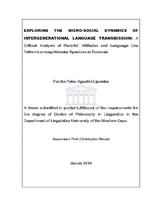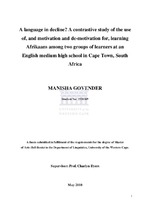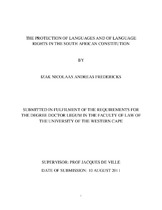An analysis of official language policies and their relationship to everyday language use in multilingual bank settings in the Free State province
Abstract
This study intended to provide an analysis of the language use in the multilingual setting of banks in the Free State Province. The study further determined the status of African languages in the banking sector in relation to perceptions about the use of African languages when transacting and communicating in the banks. The study also highlighted the importance of language planning and policy in the banks. Mixed methods of conducting research, that is, qualitative and quantitative research methods were employed by the study, and questionnaires, interviews and observations were used to collect data. Banking clients and consultants were sampled randomly in the banks operating in the five cities/towns of the Free State Province, namely Bloemfontein, Harrismith, Welkom, Trompsburg and Sasolburg. The rationale for this study was that the use of English as sole language of business and communication in the banking sector has continued without being challenged, while African languages are not used. The language used by banks in their signage inside the banks, official documents such as loan contracts, agreements, investments, and savings documents are written in English, whereas the majority of customers at most banks are speakers of African languages
Collections
Related items
Showing items related by title, author, creator and subject.
-
Exploring the micro-social dynamics of intergenerational language transmission: a critical analysis of parents's attitudes and language use patterns among Ndamba speakers in Tanzania
Lipembe, Pembe Peter Agustini (University of the Western Cape, 2010)The study has several implications; for general theoretical traditions it highlights the point that ambivalent attitudes and incomplete language use are responsible for gradual language decline. Previous studies while ... -
A language in decline ? :a constrastive study of the use of, and motivation and de-motivation for, learning Afrikaans among two groups of learners at an English medium high school in Cape Town, South Africa
Govender, Manisha (University of the Western Cape, 2010)Afrikaans in practice replaced Dutch and became one of South Africa's official languages (along with English) from 1925. It reached the apex of its development and influence during the years of Nationalist party rule and ... -
The protection of languages and of language rights in the South African constitution
Fredericks, Izak Nicolaas Andreas (University of the Western cape, 2011)The 1996 South African Constitution contains a number of provisions that deal specifically with the protection of languages and of rights relating to language. The most important of these is section 6 which recognises 11 ...




